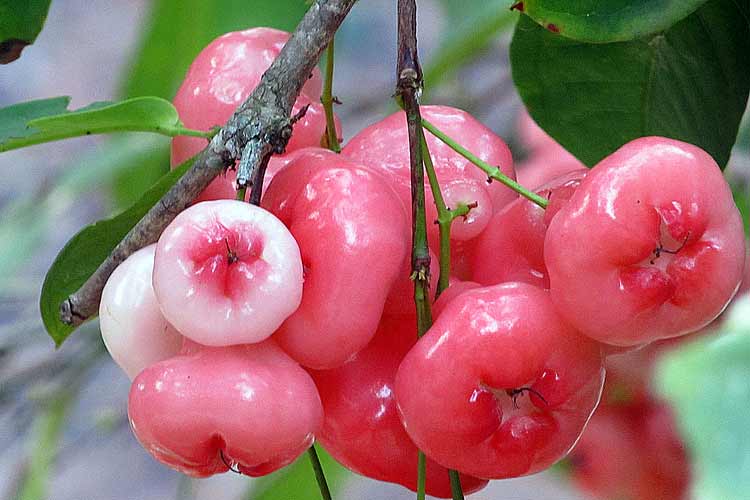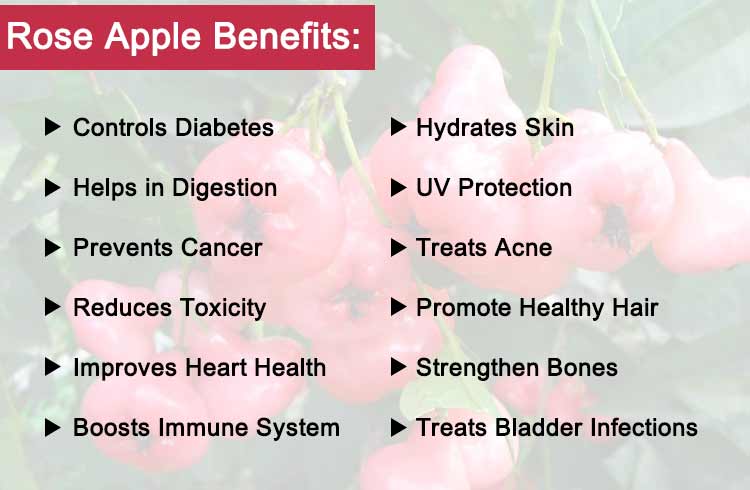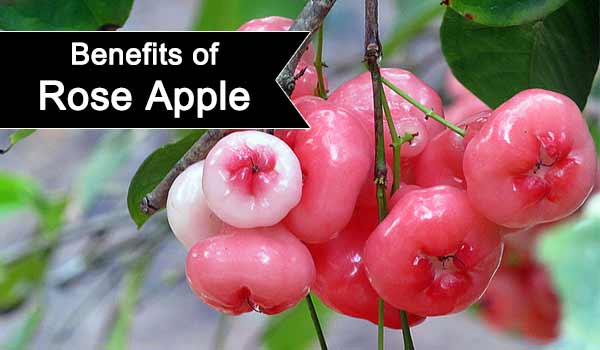Did you know that the rose apple is used for both food and medicinal purposes? It is also known by the scientific name of Syzgium Jambos. The fruit has several health benefits including protection against diabetes, better digestive system, improved immune system, cancer prevention, reduced fever, and treatment against epileptic seizures.

What Is A Water Apple?
Water Apple is a delicious South East Asian tropical fruit known for its thirst-quenching properties. Rich in fiber, calcium, magnesium, potassium, and Vitamin C, its ripe fruit possesses bright red colour, crunchy texture, and great sweetness. Other commonly used names for it include, “Rose Apple”, “Java Apple”, “Chambakka or Jambaka fruit”, “Wax Apple”, and “Watery Rose Apple”.
Know The Rose Apple:
Despite the similarity in its name, water apples are not similar to apples. In fact, they are interrelated to guavas. The most edible variety of water apples is Syzgium Jambos.
The rose apple plant is a small shrub that is native to Southeast Asia and is widely used as an ornamental plant. It is known by several names, out of which Jambu is a popular choice.
The rose apples have a similar resemblance to guavas but are different in texture, flavor, and taste. They also contain just one or two large unarmored seeds. They are bell-shaped and can be consumed raw or prepared with several dishes and desserts.
Rose Apple Nutritional Values:
The nutritional facts of rose water apples per serving are as follows:
| Vitamins | ||
|---|---|---|
| Nutrient | Amount | DV |
| Niacin | 0.800 mg | 4% |
| Riboflavin | 0.030 mg | 2% |
| Thiamin | 0.020 mg | 1% |
| Vitamin A | 339.00 IU | 7% |
| Vitamin A, RAE | 17.00 mcg | |
| Vitamin B12 | 0.00 mcg | 0% |
| Vitamin C | 22.3 mg | 37% |
| Minerals | ||
| Nutrient | Amount | DV |
| Calcium, Ca | 29.00 mg | 3% |
| Copper, Cu | 0.016 mg | 1% |
| Iron, Fe | 0.07 mg | 0% |
| Magnesium, Mg | 5.00 mg | 1% |
| Manganese, Mn | 0.029 mg | 1% |
| Phosphorus, P | 8.00 mg | 1% |
| Potassium, K | 123.00 mg | 3% |
| Sodium, Na | 0.00 mg | 0% |
| Zinc, Zn | 0.06 mg | 0% |
| Proteins and Amino Acids | ||
| Nutrient | Amount | DV |
| Protein | 0.60 g | 1% |
Calories: 36 calories in 145 grams of Rose-Apples.
Rose apples have a high content of dietary fiber, Vitamin C, Vitamin A, calcium, niacin, thiamin, potassium, and sulfur. They also contain betulinic acid, jambosine, and friedelolactone. A 100 gram of rose apples has 29 mg calcium, 123 mg potassium, and 13mg sulphur.
Top 14 Benefits of Rose Apple(Water Apple)
Here are some essential benefits related to this mouthwatering water apple fruit. Let’s take a closer look at them.

1. Controls Diabetes:
Rose apples contain Jambosine, an alkaloid type that can block or regulate the exchange of starch into sugar. This is essential for those people who are at risk of developing diabetes.
2. Helps in Digestion:
The high fiber content present in water apples makes it great for regulating the food passage through the digestive tract. This helps to relieve constipation and other health problems. In addition, the seeds of the rose apples have been used for preventing diarrhea and dysentery.
3. Prevents Cancer:
Rose apples contain active organic compounds, together with Vitamin C and A. Early studies and traditional medical research proves prostate cancer and breast cancer is reducible with the addition of rose apples to your diet.
4. Reduces Toxicity:
Rose apple decoction has been utilized as a diuretic substance for many years. This has been helpful in removing toxins from the liver and kidney while improving overall health and metabolism in our body.
5. Improves Heart Health:
Rose apples contain fiber and nutrients that show positive effects on controlling cholesterol levels, reduce the risk of atherosclerosis, and prevent cardiovascular problems like strokes, heart disease, and heart attacks.
6. Boosts Immune System:
Rose apples contain active and volatile compounds that have been connected with having anti-microbial and anti-fungal effects. Studies have proven that it can protect the skin from developing several infections and can improve the immune system against various diseases.
7. Treats Bladder Infections:
People suffering from bladder infections should include rose apples in their diet. The fruit contains chemical compounds that help in flushing out toxins. It is a natural diuretic that can stimulate the disposal of urine for people suffering from bladder problems. In addition, consuming rose apples can also help in preventing kidney stones formation.
Also Read: Benifits Of Prekese
Rose Apple Benefits For Skin
11. Hydrates Skin:
Rose apples hydrate and cleanse the skin. You can apply the juice of rose apple on your face until it dries up. This can help in balancing the oil production and serve as a hydrating mask.
12. UV Protection:
Rose apple contains UVB defending components that can provide protection from direct sunlight. The fruit can further treat sunburn and prevent peeling.
13. Treats Acne:
Studies have shown that the extract of rose apples contain anti-acne properties like anti-inflammatory, antioxidant, and anti-bacterial agents.
Also Read: Benifits Of Guyabano Leaves
Rose Apple Benefits For Hair:
14. Promote Healthy Hair:
Rose apples contain a compound known as procyanidin B-2 which stimulates hair growth and thickening. Using its extract can prevent hair thinning and baldness.
Water Apple Side Effects
There are a few side effects of taking water apples. They are as follows:
- The leaves, seeds, and roots of rose apples contain a high amount of cyanide or prussic acid that is dangerous for health.
- Over-consumption of the fruit apart from its skin and flesh is not advisable.
- Always consult a doctor before including the water apple in your diet.
FAQS on Rose Apple
1. How does water apple taste like?
A ripened water apple is a bright red color fruit, crunchy and quite sweet in taste.
2. Is water apple good for high blood pressure?
A water apple fruit has a high potassium and low sodium content. This will help in lowering blood pressure.
3. Describe the traditional usage of the rose apples?
The water apple bark decoction is made from an astringent found in folklore medicine found in Malaysia for treating thrush. Its fruit is served as a salad at the childbirth ceremony and is used as a tonic for treating the liver and brain.
Its flowers can be used for treating fever. It can be prepared by using a sweeter prepared from flowers.
The leaf decoction acts as a diuretic and expectorant for treating rheumatism and to treat sore eyes.
The health conditions like dysentery and diarrhea can be treated with the use of rose apple seeds. In fact, people from Nicaragua make use of roasted and powdered seed infusions for treating diabetes. While the Columbian people use seeds that possess pain-killing properties.
The roots of the rose apples are used by the Cuban people for treating epilepsy.
4. How are raw apples consumed?
Rose apples can be taken in raw and preserved forms like jellies and jams. It can also be added to desserts for making fruit sauce.
5. What are the different types of rose apples?
The different types of rose apples are Java Rose Apple, Jambu, Water Rose Apple, and Malay Rose Apple.
Disclaimer:
All material in this article is provided for your information only and may not be construed as medical advice or instruction. No action or inaction should be taken based solely on the contents of this information; instead, readers should consult appropriate health professionals on any matter relating to their health and well-being.
The benefits of rose apple are numerous. But before including the fruit in your diet, take the advice of a health practitioner. Over-consumption of rose apple apart from its flesh and skin is not advisable.
Conclusion
In conclusion, our journey through the delightful world of Rose Apple, also known as Chambakka or Java Apple, has revealed a treasure trove of health benefits and insights into this exotic fruit. From its refreshingly sweet taste to its numerous nutritional advantages, Rose Apple has truly earned its place as a popular and cherished fruit in many cultures.
As we explored the various benefits of Rose Apple, we learned about its rich source of vitamins, minerals, and antioxidants, which contribute to overall well-being. Whether it’s promoting a healthy digestive system, supporting cardiovascular health, or enhancing the immune system, this fruit has proven itself to be a valuable addition to a balanced diet.
So, the next time you come across Rose Apple at your local market or in the exotic fruit aisle, don’t hesitate to try it out and reap the benefits it has to offer. Let Rose Apple add a touch of tropical delight to your palate and infuse your body with the goodness of its nutrients.

2 comments
Thanks for your wonderful article…but, there is another beautiful fruit in the same family called Rose Apple…and I call this the Water Apple…
Thanks for this. I don’t have any risks but I eat it daily. but, there is another beautiful fruit in the same family called Rose Apple. I call it chambakka.